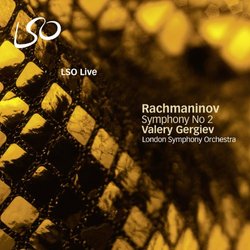Setting a new standard in the Rachmaninov Second
Santa Fe Listener | Santa Fe, NM USA | 05/11/2010
(5 out of 5 stars)
"I think few people would disagree that Gergiev is our pre-eminent Rachmaninov conductor. Not so long ago that would have been minor praise, but with the influx of so many talented Russian conductors, the once fairly rare Rachmaninov Second has become a concert staple. Gergiev doesn't need to make a case for it. Heavily cut, it has always been a plush toy for the ears. Ormandy held the patent for decades in the U.s. before ceding his place to a knockout reading from Previn and the London Sym. in 1973, still extant as one of EMI's Great Recordings of the Century. It was a satisfyingly gorgeous reading, yet Gergiev now comes along to set a new standard.
There is always present in Rachmaninov's symphonies a gaudy lusciousness reminiscent of Hollywood film scores. But Gergiev heads in the opposite direction. He feels each bar personally and expresses every emotion genuinely. The same fork in the road appears in Tchaikovsky, and it took Mravinsky's benchmark DG recordings in the early Sixties to tell the West that for Russians, Tchaikovsky is their Beethoven. I suppose that makes Rachmaninov their Brahms, but the point is that the panoramic melodrama and heightened fervency is considered normal, not a neon-lit excess. with that in mind, Gergiev is the only conductor I've heard who can traverse the entire distance between quiet melancholy to frenetic outburst while making both extremes sound perfectly apt.
I've heard him conduct the Rachmaninov Second in concert with the CSO, an overwhelming experience of the kind you never want to end -- he justifies opening up all the usual cuts. But in the intervening five years or so, Gergiev has become twice as nuanced and varied in his approach. He's fortunate that the London Sym., that chameleon of orchestras, adapts so perfectly t his style. Not the slightest gesture is lost on them. the only complaint anyone could have is that Too much sensitivity has been applied. The same held true for their recent Prokofiev Romeo and Juliet. Gergiev is so focused and concentrated that the listener is left with no breathing room, even for a moment.
Gergiev's first Rachmaninov Second on Philips struck me as underplayed but in fact it was the beginning of a learning curve, and now we have the ripe fruit of Gergiev's growing process."
Gergiev versus Gergiev
Marc Haegeman | Gent, Belgium | 06/06/2010
(3 out of 5 stars)
"For the last twenty years Valery Gergiev has proven extremely prolific on the CD market. Next to being one of the busiest maestro's in the world, he has been churning out recordings, studio as well as concerts, even combining labels (Philips, Decca, LSO live and now his own Mariinsky label), at a dazzling pace. Yet, if the beginnings in the early 1990s appeared beautifully auspicious and Gergiev has given us some truly memorable discs, the quality of his CD output has now become as variable as the weather in Brighton.
For some reason, he started re-recording scores he released earlier in his career, as if to say these weren't good enough. Well, be that as it may, but are they really better? After a disappointing full-length "Romeo and Juliet" from Prokofiev which did not improve on his first attempt for one bar, he now goes back to another of his very first discs, Rachmaninov's 2nd Symphony, and again the Mariinsky Orchestra is replaced by the London Symphony Orchestra, taped live at the London Barbican in September 2008. Perversely, history does repeat itself one could say, because at the time when Gergiev recorded Rachmaninov in St. Petersburg in early 1993 the Philips engineers still hadn't quite mastered the acoustics of the Mariinsky Theatre as they would manage later on, and now the Classic Sound people are still struggling with the flat, deadening Barbican acoustics. Yes, we are fifteen years later and the new Rachmaninov does indeed sound more agreeable than the Mariinsky one which captured the orchestra playing under a bell jar, but it's still a far cry from what for example Amsterdam's Concertgebouw has achieved. On the other hand, the LSO is without doubt the better formation of the two, with especially superb strings.
But how was the performance Mrs Lincoln? Actually, Gergiev's redux doesn't come very different from his first effort, except perhaps that he here and there emphasizes some of the cheaper effects, I suppose justified by the concert-hall (the timpani crash at the end of the 1st movement, the accelerando in the coda). But for the remainder he takes the same one-track dark-toned, leisured and rather strait-laced approach, that some will readily interpret as a refusal to indulge in the saccharine pitfalls this music can have plenty of, but which when taken this far also strips it of its visceral thrills, emotional shading, color and pure sonic excitement - as others like Evgeny Svetlanov, Vladimir Ashkenazy, Gennady Rozhdestvensky, and Eugene Ormandy have provided aplenty. Focused as he is, Gergiev exerts a tight grip upon the flow of the music but as has been a noticeable flaw in other recent recordings he hardly ever allows it to take flight and with his too uniformly monochrome approach this symphony becomes a rather dull 61 minutes to sit repeatedly through.
In the end Gergiev only replaces one recording of Rachmaninov's 2nd and that's his own. But for the remainder I can only hope that, unlike a reviewer suggested here, this does not become the standard of Rachmaninov for the coming years. Surely, this music has a lot more in store than Gergiev is prepared to give us.
"


 Track Listings (4) - Disc #1
Track Listings (4) - Disc #1